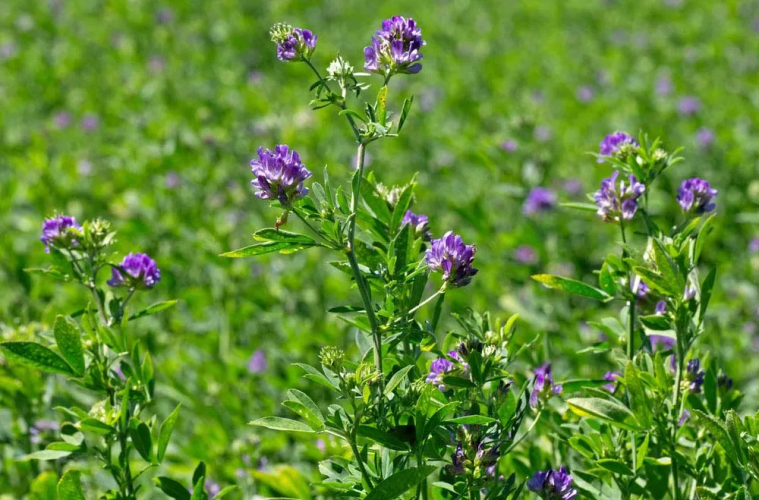In the realm of gardening, few plants offer as many benefits as alfalfa. Often overlooked in favour of more popular crops, alfalfa is a powerhouse of nutrients, a boon for soil health, and an excellent companion plant. Here’s why you should consider adding this remarkable plant to your garden.
Nutrient-Rich Superfood
Alfalfa is not just for livestock; it’s a nutritional treasure for humans too. Rich in vitamins A, C, E, and K, as well as minerals like calcium, magnesium, and iron, alfalfa can be a fantastic addition to your diet. Fresh sprouts are a common sight in salads and sandwiches, adding a delightful crunch and a nutrient boost to your meals.
Soil Health Enhancer
One of alfalfa’s standout qualities is its ability to improve soil health. As a legume, they have a symbiotic relationship with nitrogen-fixing bacteria. This means it can convert atmospheric nitrogen into a form that plants can use, enriching the soil with this essential nutrient. Growing them can reduce the need for synthetic fertilisers, promoting a more sustainable gardening practice.
Deep Root System
Alfalfa’s deep root system is a gardener’s ally. These roots can extend several feet into the soil, breaking up compacted layers and improving soil structure. This deep rooting also helps in drought resistance, as alfalfa can access water from deeper soil layers, making it an ideal crop for areas with less frequent rainfall.
Weed Suppression
Alfalfa’s dense foliage and vigorous growth habit can suppress weeds effectively. By out-competing weeds for light, water, and nutrients, alfalfa reduces the need for chemical herbicides. This natural weed control is another way they contribute to a healthier, more sustainable garden ecosystem.
Beneficial for Pollinators
When in bloom, alfalfa produces a plethora of purple flowers that are a magnet for pollinators like bees. By growing alfalfa, you’re providing a valuable food source for these essential garden visitors, helping to boost pollination rates for your other crops.
Great Companion Plant
Alfalfa makes an excellent companion plant. It can be inter planted with a variety of vegetables and fruits, providing them with the benefits of improved soil structure and added nitrogen. Its deep roots don’t compete with shallow-rooted plants, making it a harmonious addition to diverse garden beds.
Easy to Grow
Alfalfa is relatively easy to grow, making it suitable for both novice and experienced gardeners. It thrives in a range of soil types, provided they are well-drained, and it prefers full sun. Once established, alfalfa requires minimal maintenance, making it an effortless yet rewarding addition to your garden.
Versatile Uses
Beyond its use as a fresh sprout, alfalfa can be dried and used as a mulch or compost additive, further enhancing soil health. It’s also commonly used in green manure mixes, where it is grown and then tilled back into the soil to add organic matter and nutrients.
Nutritional Benefits for Poultry and Rabbits
For those who raise poultry and rabbits, alfalfa offers substantial nutritional benefits. Alfalfa is rich in protein and essential amino acids, which are crucial for the growth and development of these animals. The high fibre content aids in digestion, ensuring that poultry and rabbits maintain a healthy gut. Additionally, the vitamins and minerals present in alfalfa contribute to overall health, enhancing egg production in poultry and improving coat quality and reproductive health in rabbits. Including alfalfa in the diet of your poultry and rabbits not only boosts their health but also reduces the need for supplemental feeds, making it a cost-effective and natural option.
Incorporating them into your garden is a decision that brings a multitude of benefits. From improving soil health to providing nutritional value and supporting pollinators, alfalfa is a versatile and beneficial plant. Whether you’re looking to enhance your garden’s sustainability, boost soil fertility, or simply enjoy the fresh taste of homegrown sprouts, alfalfa is a wonderful choice.
By growing alfalfa, you’re not only enriching your garden but also taking a step towards a more sustainable and health-conscious lifestyle.
ALSO SEE:
Image credit: Unsplash

